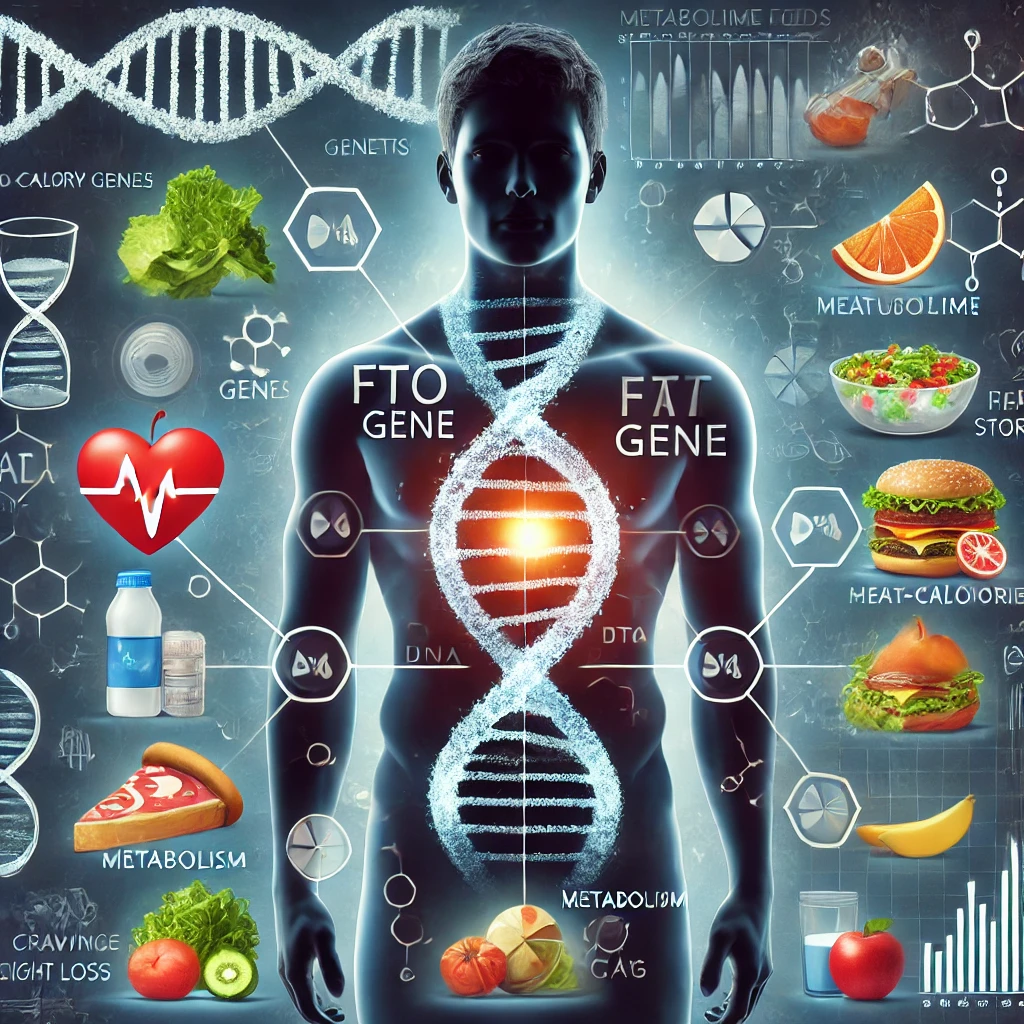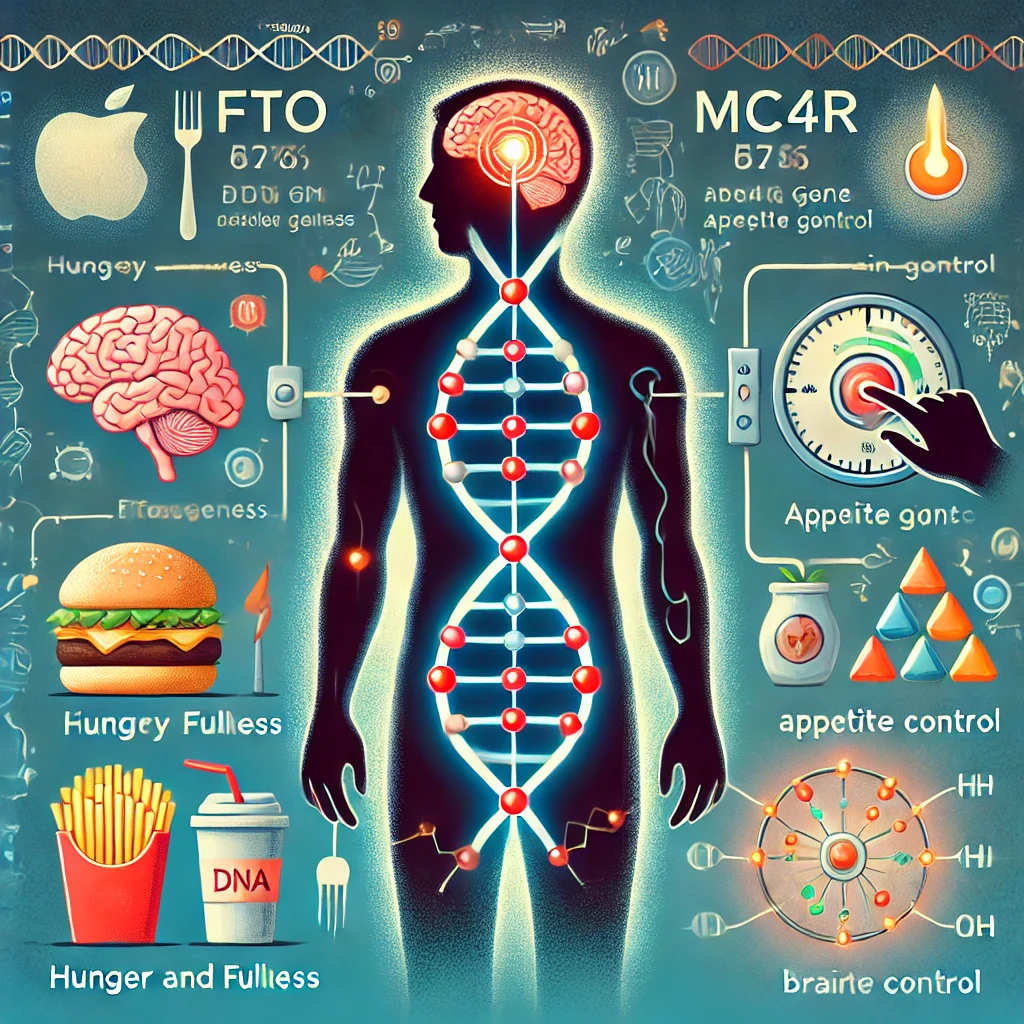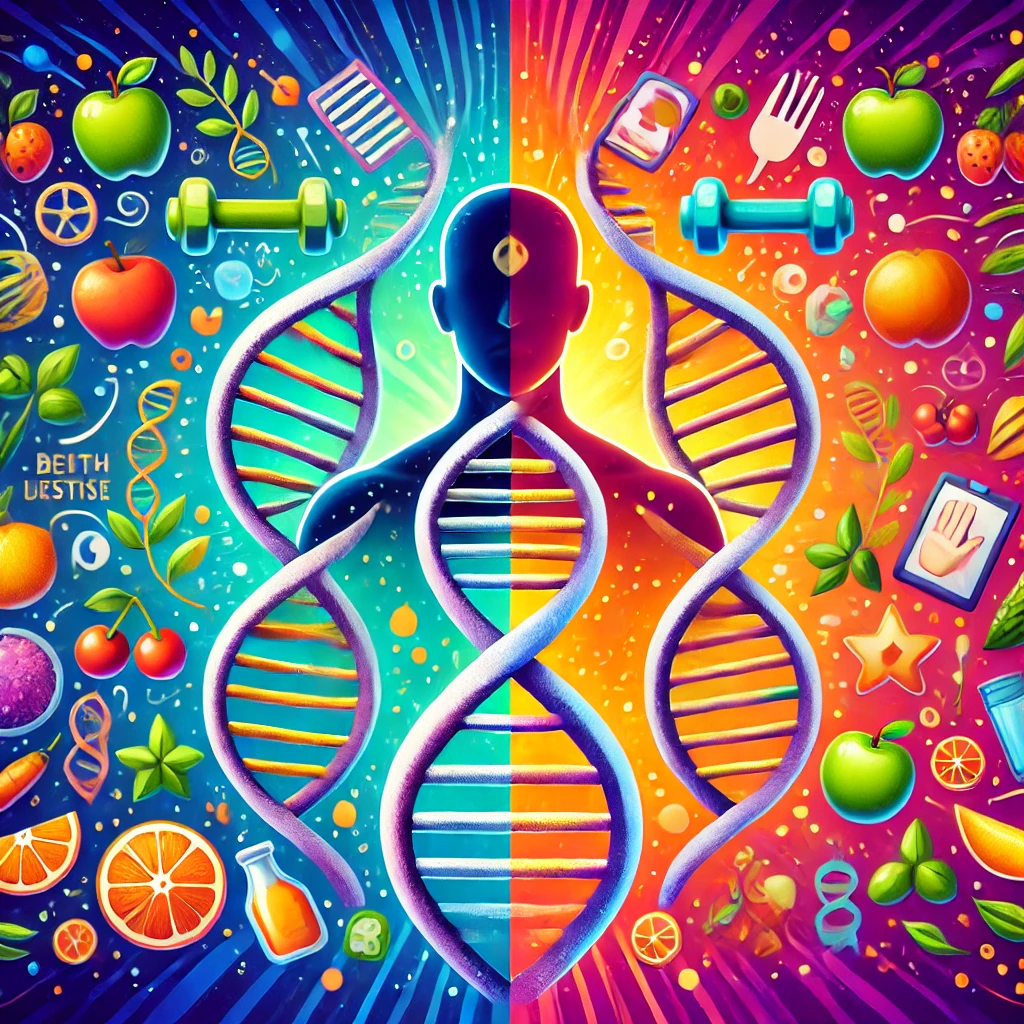
Have you ever tried to lose weight but felt like no matter what you did, the results were just so slow? I remember feeling the same way. I’d watch people eat whatever they wanted and still stay slim, while others would try all kinds of diets and workouts but didn’t see much change. It made me wonder—what’s going on? Is there some kind of secret trick that only certain people know?
That’s when I started learning about how our genes might be involved in weight loss. You know, the DNA we get from our parents? It turns out that certain genes could be affecting how easy or hard it is for us to slim down. In this blog, I’ll take you on a journey to discover how these genetic factors might actually play a role in how we lose weight!
Genetics Basics
So, let’s start with the basics—what exactly are genes? I used to think they were just something scientists talked about, but they’re actually really cool! Genes are tiny pieces of information inside our bodies that decide things like our eye color, hair type, and even how tall we are. We get them from our parents, kind of like passing down family recipes. Everyone has their own set of genes, and they make us who we are.
Now, here’s where it gets interesting. Genes don’t just affect what we look like, but they can also play a part in how our body works—including how we gain or lose weight. Some people might have genes that make it easier for them to burn calories or keep their weight stable, while others might have genes that make losing weight a bit more challenging.
It’s like trying to run a race. Some people might have an easier path, while others have to work a little harder to get to the finish line. Understanding how our genes work can help explain why we all have different experiences with weight loss!
What are genes, and why are they important?
Can genes really affect my weight?
The Role of Genetics in Weight

I used to think losing or gaining weight was all about what we eat and how much we exercise, but then I found out that genetics play a big role too. It’s like our genes are working behind the scenes, deciding how our bodies handle food and fat. For some people, their genes make it easier to stay slim, while others might find it harder no matter how healthy they eat or how often they exercise.
Scientists have been studying this for a while, and they’ve found that certain genes can affect things like how fast our metabolism is (that’s how quickly we burn calories) or how our bodies store fat. There’s even a gene called the FTO gene, which researchers found could be linked to higher body weight. People with certain versions of this gene might find it harder to lose weight, even if they’re doing everything “right.”
One study I read about showed that people with these genes might have more cravings for high-calorie foods or feel less full after eating. It’s kind of like their bodies are telling them to eat more, even when they don’t need to. That made me realize why weight loss isn’t the same for everyone—it’s not just about willpower, but also about the way our bodies are wired from the inside.
Understanding this made me feel better because it shows that there’s more to the story. While genetics can make things tricky, it’s still possible to lose weight. We just might have to find different ways that work best for our own bodies!
The Role of Genetics in Weight
I used to think losing or gaining weight was all about what we eat and how much we exercise, but then I found out that genetics play a big role too. It’s like our genes are working behind the scenes, deciding how our bodies handle food and fat. For some people, their genes make it easier to stay slim, while others might find it harder no matter how healthy they eat or how often they exercise.
Scientists have been studying this for a while, and they’ve found that certain genes can affect things like how fast our metabolism is (that’s how quickly we burn calories) or how our bodies store fat. There’s even a gene called the FTO gene, which researchers found could be linked to higher body weight. People with certain versions of this gene might find it harder to lose weight, even if they’re doing everything “right.”
One study I read about showed that people with these genes might have more cravings for high-calorie foods or feel less full after eating. It’s kind of like their bodies are telling them to eat more, even when they don’t need to. That made me realize why weight loss isn’t the same for everyone—it’s not just about willpower, but also about the way our bodies are wired from the inside.
Understanding this made me feel better because it shows that there’s more to the story. While genetics can make things tricky, it’s still possible to lose weight. We just might have to find different ways that work best for our own bodies!
How do genes and weight connect?
Is weight loss all about genetics?
Specific Genes Associated with Weight

When I started learning about how genes affect weight, I found out that some specific genes play a big role in how our bodies handle fat and food. Two of the main ones are called the FTO gene and the MC4R gene. They sound like robot names, right? But these genes are actually inside all of us, and they can make a big difference in how we gain or lose weight!
First, let’s talk about the FTO gene. This gene has been linked to weight gain because it can affect how hungry we feel and how much fat our bodies store. People with certain versions of this gene might feel hungrier than others or have a hard time feeling full after a meal. I remember reading that this could explain why some people seem to be craving food more often, even if they’re eating enough. It’s like their bodies are telling them to eat more, which can lead to weight gain over time.
Next is the MC4R gene. This one is also connected to weight, but in a different way. The MC4R gene helps control how much food we eat by signaling to our brain when we’re full. If this gene isn’t working properly, the signal might not get through, so the person might keep eating even when they’ve had enough. Imagine trying to turn off a light, but the switch just won’t work—that’s kind of what happens with this gene when it comes to controlling appetite.
Learning about these genes helped me understand why weight loss can be harder for some people. It’s not just about willpower or making healthy choices—sometimes, our genes are influencing how we feel about food and how our bodies react to it. Knowing this made me realize that everyone’s weight loss journey is different because our bodies are all unique in the way they work!
What is the FTO gene, and how does it affect weight?
What does the MC4R gene do?
Genetic Testing for Weight Loss
One day, I heard about something really cool: genetic testing for weight loss! It’s like getting a sneak peek into your body’s code to see if your genes are affecting your ability to lose weight. The idea is that scientists can study your DNA (the instructions that make you who you are) and find out if you have certain genes that make it harder or easier to slim down. Sounds amazing, right?
So, how does it work? Well, you can actually order a kit online, and they send you a little tube to spit in (gross, I know, but it’s part of the process!). You mail it back, and they test your saliva to look for genes like FTO or MC4R—the ones that we know are linked to weight gain. The results might tell you whether you’re more likely to feel hungrier, have cravings, or store fat differently than others.
Now, here’s the fun part: some people use these test results to create a personalized weight loss plan. For example, if your genes show that you have a slow metabolism, your plan might focus more on exercises that boost your metabolism. If your genes suggest you crave high-calorie foods, you might learn strategies to fight those cravings.
But there are some limitations too. Just because a test tells you something about your genes doesn’t mean it’s a magic solution. Your genes are only part of the puzzle—things like your diet, exercise, sleep, and stress also matter a lot. Plus, not all genetic tests are 100% accurate, and scientists are still learning about how genes really affect weight loss.
In my opinion, genetic testing could be helpful, but it’s not a one-size-fits-all answer. It might give you some useful clues about your body, but you still need to work on healthy habits. After all, genes can give you some information, but you’re the one in charge of making healthy choices every day!
What is genetic testing for weight loss?
Is genetic testing for weight loss accurate?
Lifestyle Factors vs. Genetics

When I first learned that genetics could affect weight loss, I thought, “Wow, maybe it’s all out of our control!” But then I realized something really important: even though our genes play a part, our lifestyle choices—like what we eat and how much we move—matter just as much, if not more. It’s kind of like having a recipe where the ingredients (our genes) are fixed, but how we cook the dish (our lifestyle) can totally change the outcome!
For example, you could have a gene that makes it harder to lose weight, but if you eat healthy foods and exercise regularly, you can still manage your weight. I’ve seen people with all sorts of body types make progress by making small changes like adding more vegetables to their meals or going for daily walks. It might take a little longer, but the results can still happen!
What’s really interesting is how our genes and lifestyle interact. Imagine your genes are like the foundation of a house—strong and important—but your lifestyle is like the decorations you add to make it comfortable and livable. Even if the foundation is tricky, you can still make a big difference by choosing the right things to eat, finding fun ways to stay active, and getting enough sleep.
One thing I’ve learned is that focusing on lifestyle gives us more control. Sure, some people might have genes that help them stay slim without much effort, but everyone can make changes to improve their health. Whether your genes make weight loss easy or hard, you can always make choices that help you feel your best.
Which is more important for weight loss: genetics or lifestyle?
Can someone with “bad” weight genes still lose weight?
In the end, it’s not just about your genes—it’s about how you combine what you were born with and the choices you make every day. And that’s pretty powerful!
Conclusion
So, let’s recap everything we’ve learned about genetics and weight loss. First, we found out that our genes can affect how easy or hard it is to lose weight. Genes like FTO and MC4R can influence things like hunger, cravings, and how our bodies store fat. While these genes play a role, they aren’t the whole story—our lifestyle choices, like what we eat and how active we are, make a huge difference too.
Even though scientists have discovered a lot about genetics and weight loss, there’s still so much more to learn. Future research might help us understand even more about how genes affect weight and what kinds of personalized plans could work best for each person. Maybe one day we’ll have even more tools to help us based on our genetic makeup!
But what can we do right now? The most important takeaway is to focus on what we can control. Even if your genes make weight loss tricky, making small changes to your diet, staying active, and managing stress can still lead to success. It might take more effort for some people, but it’s totally possible to reach your goals. Remember, your genes don’t define everything—you have the power to shape your own healthy lifestyle!
So, while genetics may give us some clues, the real key to weight loss is a combination of smart choices and staying positive. You’ve got this!
What’s the most important thing to remember about weight loss and genetics?
Is there hope for better weight loss solutions in the future?
Transform Your Body Naturally with LipoSlend: The At-Home “Liposuction” Solution
Are you struggling with stubborn fat and searching for a natural, effective solution to support your weight loss journey? Introducing LipoSlend, the revolutionary at-home “liposuction” method that works with your body’s natural processes to stop fat vessels from growing, multiplying, and feeding more fat cells!
What makes LipoSlend so unique?
Inside every drop, you’ll find a proprietary blend of Sulforaphane, Cissus Quadrangularis, Pine Pollen Extract, Acetyl L-Carnitine, Beet Root Extract, and Glucomannan—all scientifically combined to help support healthy and steady weight loss. Plus, it’s:
- 100% Natural
- Non-GMO
- Stimulant-Free
- Easy to Use!
Order now and get 2 FREE bonuses:
- Flawless Skin Secrets – Tighten loose skin and banish cellulite (Retail Price: $55 – Today: FREE)
- Primal Desserts – Fat-burning, decadent, and delicious sweets (Retail Price: $54 – Today: FREE)
Best Value:
97% of customers choose the 6-bottle option for just $294 (That’s a huge discount and FREE shipping)!
And if you’re not completely satisfied with the results, every order comes with a 60-day money-back guarantee, no questions asked.
Claim your discounted LipoSlend now and start your transformation!
10 Easy Meal Prep Recipes for Weight Loss: Simplify Your Journey to a Healthier You
Pingback: Weekend Warriors: 7 Benefits of powerful Weekend Workouts
I really appreciate your help
Your articles are extremely helpful to me. Please provide more information!
Good web site! I truly love how it is easy on my eyes and the data are well written. I am wondering how I could be notified whenever a new post has been made. I’ve subscribed to your RSS which must do the trick! Have a nice day!
Thank you so much for your kind words! I’m glad you find the site easy on the eyes and the content well-written. 😊
Subscribing to our RSS feed is a great way to stay updated, and we really appreciate it! For even more updates and community interaction, feel free to follow us on Facebook and Pinterest. We regularly post new content, tips, and more on those platforms too.
Thank you for writing this article. I appreciate the subject too.
How can I find out more about it?
I really appreciate your help
Thank you for writing this article. I appreciate the subject too.
Thanks for posting. I really enjoyed reading it, especially because it addressed my problem. It helped me a lot and I hope it will help others too.
Your articles are extremely helpful to me. May I ask for more information?
Thank you so much! I’m thrilled to hear that you find the articles helpful. Absolutely, feel free to ask for more information on any topic—I’m here to help and provide as much value as I can. Just let me know what you’re interested in, and I’ll do my best to assist!
I want to thank you for your assistance and this post. It’s been great.
Good web site! I truly love how it is easy on my eyes and the data are well written. I am wondering how I could be notified whenever a new post has been made. I’ve subscribed to your RSS which must do the trick! Have a nice day!
Thank you for the kind words and for subscribing to my RSS feed! To stay updated on all my latest posts and insights, you can also follow me on any of these platforms:
Facebook
Quora
Medium
Slideshare
Disqus
Pinterest
Tumblr
Ko-fi
Thank you for your support, and have a fantastic day! 😊
Thanks for posting. I really enjoyed reading it, especially because it addressed my problem. It helped me a lot and I hope it will help others too.
This is the suitable blog for anybody who desires to seek out out about this topic. You understand so much its almost onerous to argue with you (not that I truly would want匟aHa). You positively put a new spin on a topic thats been written about for years. Great stuff, just great!
Write more, thats all I have to say. Literally, it seems as though you relied on the video to make your point. You definitely know what youre talking about, why waste your intelligence on just posting videos to your blog when you could be giving us something informative to read?
Do you mind if I quote a couple of your articles as long as I provide credit and sources back to your webpage? My website is in the very same niche as yours and my visitors would definitely benefit from a lot of the information you present here. Please let me know if this okay with you. Appreciate it!
Yes, absolutely! Feel free to quote my articles as long as you provide proper credit and include a link back to my webpage. I appreciate your interest and am glad my content can benefit your audience. 😊 Let me know if you need anything else!
Many thanks to you for sharing these kind of wonderful discussions. In addition, the optimal travel and medical insurance plan can often eliminate those problems that come with vacationing abroad. The medical crisis can rapidly become too expensive and that’s bound to quickly set a financial problem on the family finances. Putting in place the excellent travel insurance bundle prior to leaving is definitely worth the time and effort. Thanks a lot